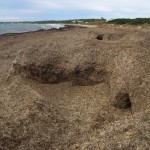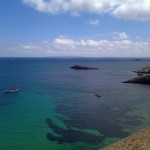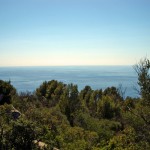Introduction
Buildings pollute*.
When you build them, the contamination is produced by manufacturing materials and production of rubble.
And when you use them, the contamination is produced by the energy to live in them.
Our proposal is to reduce pollution by 50% in manufacturing, 50% of waste production, and 75% energy for heating or cooling.
Therefore, we’ll recover techniques and materials from traditional architecture, and low-tech systems without sophisticated devices that use to get broken.
Not only for environmental issue, but also because we would live much better and costs nearly the same.
And if this is repeated widely, cities will be more friendly and nice.
*In the Balearic Islands, the energy consumption for buildings pollutes more than all transports (airplanes, cars, trucks, ships, etc.).
LIFE Reusing Posidonia project financing by European funds
The IBAVI, in collaboration with the Direcció General de Medi Natural, Educació Ambiental i Canvi Climàtic, has received a European grant worth € 754,012 from the LIFE +2012 program, to carry out the construction and monitoring of the project of 14 public housing in Sant Ferran, Formentera. This Example contributes to the development of technologies, innovative methods and tools in the field of nature conservation, climate change, environmental policy and information and communication on environmental issues in all EU Member States.
The project is a prototype to reduce the vulnerability of human environments to climate change. It establishes measures to reduce the production of CO₂ by 50 %, and therefore, if all new buildings would be made in this way, the building sector and energy consumed by this cease to be an important factor in increasing the global temperature (the construction industry produces 17% of CO₂ emissions in Spain).
The experience of this project has an added value for the EU since it is directly applicable to the Mediterranean region.
It is also a model of efficient construction to achieve the objectives of the EU 20/20/20 strategy, which requires all public buildings to achieve nearly zero consumption from December 31, 2018. At this moment, the nearest qualification in EU is Energy Class A rating. This building would be the first example of collective housing building with Energy Class A rating at the Balearic Islands.
It’s remarkable the use of dry Posidonia Oceanica, for thermal and acoustic insulation, thus hopes to demonstrate the feasibility of more environmentally-friendly forms of construction that can both reduce the emission of greenhouse gases and improve the quality of city-landscapes. We expect that the use of Neptun grass will increase its social interest and presence in the media.
The reduction of CO₂ in construction contributes directly and positively in protecting Neptune grass meadows, because of the danger they are subjected. According to the Higher Council for Scientific Research -CSIC- during XXI century, it will lose 90% of its density. This process would begin in about 40 years and it will become a functional extinction of the specie, with a moderately optimistic scenario emission of greenhouse gases.









